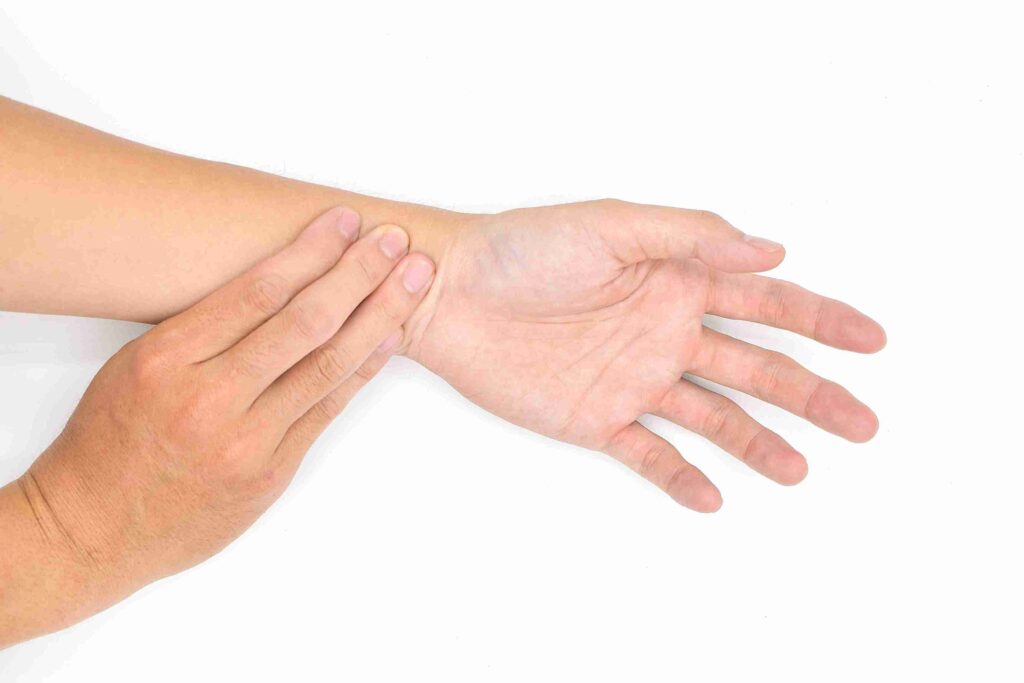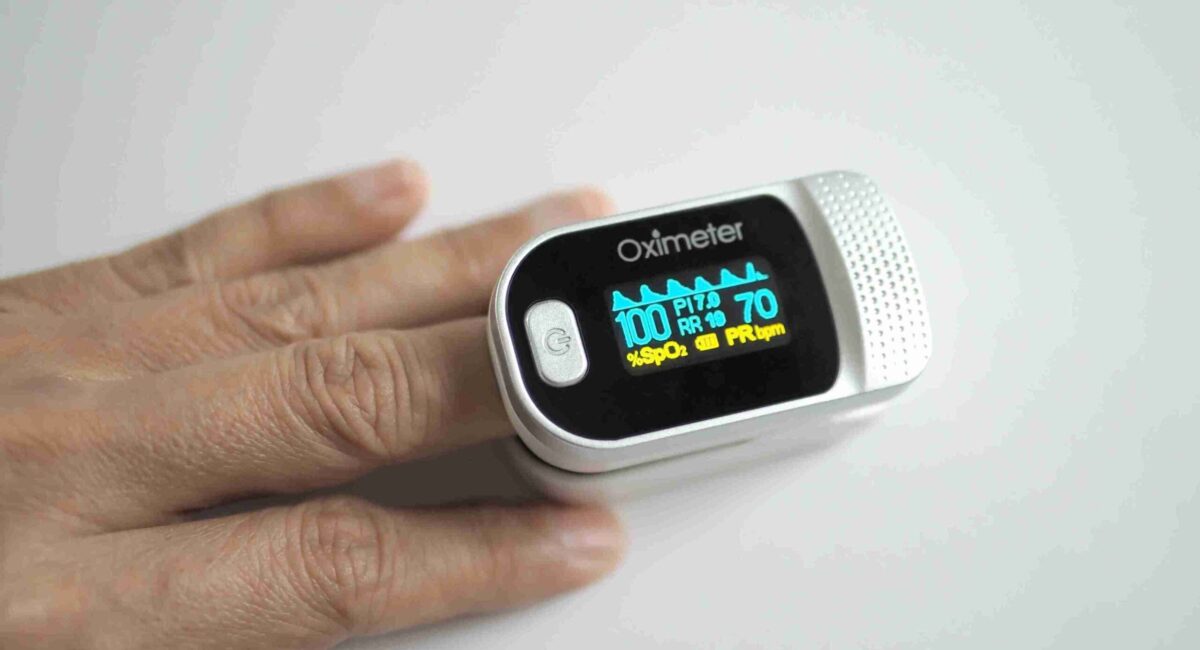It is usual for all of us to experience a fast heart rate during exercise, stress, or a steamy workout. But what if you’re sitting on a sofa or lying on your bed, and your heart starts to beat faster? A panic mode switches on as you seek a quick solution or help from somewhere.
A faster pulse rate during the resting position can be a red flag of underlying issues, such as dehydration or cardiovascular problems. In some cases, an increased heart rate along with chest pain can also be a symptom of a heart attack.
So now the question arises: Should you go to the hospital for a rapid heart rate or wait for the symptoms to subside? Is it safe to wait for your pulse to return to normal?
Read further to know at what heart rate you should contact the emergency care facility. You’ll also know whether you can approach urgent care centres for heart palpitations or not.
Table of Contents
ToggleWhat Is A Normal Heart Rate and When Should You Worry?
According to MayoClinic, a normal heart rhythm ranges from 60 to 100 beats per minute in adults. Below is a simple chart showing normal heart rate ranges based on age.
|
Age |
Heart Rate |
|
<1 year |
110-160 bpm |
|
1-2 years |
100-150 bpm |
|
2-5 years |
95-140 bpm |
|
5-12 years |
80-120 bpm |
|
>12 years |
60-100 bpm |
However, multiple factors influence heart rates apart from age, such as medications, overall fitness, and underlying medical conditions (high cholesterol, diabetes, or heart disease).
Most importantly, your heart rate depends on what action you are currently performing. For instance, when you’re at rest, your heart rate can be less than 80 bpm, and it’s normal. But what if your heart increases in the resting position? Read further to know when you should head over to the hospital.
How Do You Check Your Pulse Quickly?

- Place the middle three fingers on the upper groove of the wrist of the other hand to check your pulse.
- Next, count each pulse for 30 seconds and multiply by 2 to calculate the heart rate in one minute.
When Is a Fast Heart Rate an Emergency?
If a person is in a resting position and the heart rate consistently exceeds 100 beats per minute, it is known as tachycardia. In that case, you should seek medical assistance immediately or ask a family member to take you to the hospital.
A heart rate of more than 120 bpm can be fatal if you have any underlying medical condition such as atrial fibrillation, cardiovascular disease, diabetes or any other disease. Therefore, call the emergency care facility immediately.
Moreover, if you are non-athletic and experience a consistent pulse rate below 60 bpm, it is crucial to seek prompt medical attention.
Symptoms of Tachycardia And Associated Warning Signs
If you feel a rapid heartbeat, the first step is to check your pulse, as mentioned earlier, to determine whether you’re within the normal range (60-100 beats per minute) or if it exceeds 100 beats per minute, indicating tachycardia.
If your heart beat is more than 100 bpm and you experience other symptoms as well, the best practice is to reach emergency care.
- Fluttering or irregular feelings in the chest
- Dizziness or lightheadedness
- Fainting or near-fainting spells
- Chest pain or discomfort
- Shortness of breath or difficulty breathing
- Loss of consciousness
If you experience any of these symptoms, it’s essential to seek emergency care immediately. Ask for help from anyone nearby and tell them to call 911 immediately.
What Are The Different Types Of Rapid Heart Rate(or Tachycardia)?
Tachycardia occurs when your heart beats faster than usual, typically at a rate of over 100 beats per minute. But did you know there are different types of rapid heart rate? Here’s a quick breakdown:
- Supraventricular Tachycardia (SVT): It is a fast heartbeat starting in the upper chambers of your heart. It can come on suddenly, making you feel dizzy or out of breath.
- Atrial Fibrillation (AFib): It is an irregular heartbeat that happens when the upper chambers of your heart don’t beat properly. It can feel like your heart is racing or fluttering.
- Ventricular Tachycardia (VT): It starts in the lower chambers of the heart. It can be dangerous, causing symptoms like chest pain, fainting, or even sudden collapse. If you experience any of these symptoms, it’s a medical emergency!
- Ventricular Fibrillation (VFib): It is a life-threatening rhythm problem where the heart’s lower chambers quiver instead of pumping. This can lead to a heart attack or sudden cardiac arrest. Immediate treatment is a must!
- Sinus Tachycardia: This is when your heart beats faster due to stress, exercise, fever, or illness. It’s usually harmless and goes away once the trigger is gone.
We understand tachycardia can sound scary, but not all types are life-threatening. If you’re experiencing symptoms like a racing heart or dizziness, it’s always best to check in with a healthcare professional to get the right advice and peace of mind.
Some Common Causes Of High Pulse Rate
Not all cases of a fast heart rate are dangerous, as many everyday situations aren’t related to heart problems. Here are common normal day situations when your pulse rate may speed up, but don’t worry.
However, other causes or abnormal situations of tachycardia can’t be ignored at any moment and should be identified or treated by a medical expert.
- Underlying conditions such as asthma, high blood pressure, diabetes, stroke, anemia, etc.
- Serious heart conditions like atrial fibrillation, myocarditis, congenital heart disease, heart attack
- Endocrine disorders like hyperthyroidism, hypothyroidism, pheochromocytoma etc.
- Certain medicines (amphetamines, cocaine, anti-asthmatic drugs, decongestants)
What Causes A Rapid Heart Rate At Night?
Sometimes your heart races at night because of things like stress, anxiety, caffeine, or even eating too late
Lying down can make you more aware of your heartbeat, which can intensify palpitations.
Other triggers include poor sleep posture, dehydration, or heavy late-night meals.
While occasional nighttime palpitations are usually harmless, persistent rapid heartbeats, especially with chest pain, dizziness, or shortness of breath, should be evaluated by a healthcare provider.
How To Slow Down a Rapid Heart Rate?
A racing heartbeat can feel unsettling, but there are simple ways to calm it down, especially if it’s triggered by everyday habits rather than a serious condition.
Breathe deeply and slow down: Gentle breathing exercises or meditation help relax your nervous system and bring your pulse back to normal.
- Check your lifestyle triggers: Too much caffeine, alcohol, or nicotine can speed up your heart. Cutting back often makes an immediate difference.
- Rest and recharge: Lack of sleep and constant stress keep your body in “high alert.” A consistent sleep schedule and relaxation before bed can prevent nighttime palpitations.
- Look after your mental health: Anxiety and stress are common causes of palpitations. Taking breaks outdoors, journaling, or seeking professional support can help.
- Review your medications: Some prescriptions or over-the-counter drugs may cause palpitations. Always let your doctor know what you’re taking so adjustments can be made safely.
Most of these changes not only calm your heart but also improve your overall health. However, if a rapid heartbeat is accompanied by chest pain, dizziness, or fainting, don’t wait. Contact your doctor or seek emergency medical attention.
Read More: How Can I Improve My Heart Health With Garlic and Turmeric
Seek Help From Family Urgent Care For Heart Palpitations
Heart palpitations or a rapid heart rate can cause concern for you and your family. If you’re feeling uneasy or just need reassurance, don’t hesitate to visit our urgent care clinic in Indiana or Illinois for a quick consultation.
When Can Urgent Care Help With Rapid Heart Rate?
Our urgent care clinic is well-equipped to handle a variety of heart-related concerns, including palpitations and a rapid heartbeat.
If your heart rate is elevated but you’re not experiencing severe symptoms like chest pain or shortness of breath, we can assess your situation and determine the best next steps.
The course of treatment depends upon several factors such as age, current symptoms, and pre-existing medical conditions.
On the other hand, depending on your symptoms and associated comorbid conditions, you may also be referred to a specialized clinic or a relevant specialist for a more targeted and comprehensive evaluation.
If your heart rate is consistently above 100 bpm and you’re feeling anxious or lightheaded, seeking help early is always better.
Note that if your heart rate goes beyond 100 bpm and you feel pain in your chest or experience other high-alert symptoms, call 911 immediately without any delay.
FAQs
Can a common cold increase your heart rate?
Yes, a common cold can increase your heart rate. The immune system becomes activated when the body fights off an infection, such as the viruses that cause the common cold. This immune response can lead to various physiological changes in your body, including increased heart rate.
Another reason for a racing heart during the common cold can be a high fever. The body increases its heart rate to distribute heat more efficiently and support the immune response.
Note that a mild increase in heart rate is a normal body response to infections but prolonged or persistent changes in heart rate should be discussed with a healthcare professional for proper evaluation.
Does fever increase heart rate?
Yes, a moderate to high fever might increase your heart rate as part of the body’s response to infection. The elevated temperature causes the heart to beat faster, facilitating uniform heat distribution in the body.
During flu or infections, this physiological response is common. However, if you experience a faster heart rate persistently, you need to consult a healthcare professional right away.
Can COVID-19 cause a high resting heart rate?
Yes, COVID-19 can cause a high resting heart rate. The virus can induce inflammation, leading to an increased heart rate as the body responds to combat the infection.
Additionally, any respiratory issues associated with COVID-19 might contribute to elevated heart rates as the heart compensates for reduced oxygen levels.
Monitoring heart rate, especially in severe cases, is important for assessing overall health during the illness. If there are concerns about a faster heart rate along with other symptoms, you should seek medical advice immediately.


